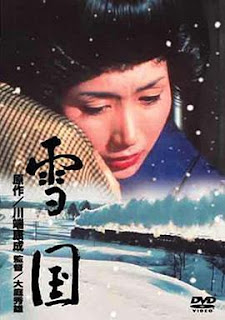31. Ē-sái kā góa lia̍h-liông bô?
M̄-koh, Yoko kan-ta sut-leh kā Shimamura lió chi̍t-ē, sáⁿ lóng bô kóng tō kiâⁿ kòe thô͘-keng.
Shimamura kiâⁿ kàu gōa-bīn, m̄-koh Yoko ê gán-sîn ká-ná iáu tī i ê ba̍k-chiu chêng siám-sih. He ná-chhiūⁿ hūiⁿ-hūiⁿ ê teng-hóe léng-léng. Sī án-nóa ē án-ne? Tāi-khài sī in-ūi siūⁿ tio̍h cha-àm ê ìn-siōng. Cha-àm Shimamura khòaⁿ tio̍h Yoko ê bīn phû-hiān tī chhia-thang po-lê, iá-gōa ê teng-hóe siám kòe, teng-hóe hām yi ê ba̍k-chiu sio-tha̍h, bî-bî siám-kuiⁿ, súi kah kóng-bē-chhut, sim-koaⁿ siū tio̍h kám-tōng. Chi̍t-ē siūⁿ tio̍h che, i mā siūⁿ tio̍h Komako phû-chhut tī kiàⁿ lāi-té bâng-bâng pe̍h-seh tiong-kan ê âng bīn.
Chū án-ne, Shimamura ta̍h kín kha-pō͘. Sui-jiân sī pe̍h-pe̍h bah-bah ê kha, hèng-chhù peh-soaⁿ ê Shimamura, ná kiâⁿ ná khòaⁿ soaⁿ, sim-sîn hóng-hut, bô-ì-tiong kha-pō͘ mā piàn kín. Lio̍h-lio̍h-á tō sit-sîn ê i, bô hoat-tō͘ siang-sìn, he chiò hông-hun kéng-tì ê kiàⁿ, hām he chiò chá-khí seh-kéng ê kiàⁿ, kèng-jiân sī jîn-kang ê mi̍h-kiāⁿ. He kám m̄-sī chū-jiân ê mi̍h-kiāⁿ? He tiāⁿ-tio̍h sī sio̍k-tī iâu-oán sè-kài ê mi̍h-kiāⁿ.
Tō liân tú-chiah lī-khui ê Komako ê pâng-keng, mā ká-ná sī sio̍k-tī iâu-oán ê sè-kài. Shimamura ka-tī mā tng-tih tio̍h-kiaⁿ, peh kàu kiā téng ê sî, chi̍t-ê lia̍h-liông cha-bó͘ kiâⁿ lâi. I ká-ná lia̍h tio̍h sáⁿ-hoàiⁿⁿ, hoah-siaⁿ kóng:
"Àn-mô͘ sai, ē-sái kā góa lia̍h-liông bô?"
"Tán chi̍t-ē. Taⁿ kúi-tiám ah?" yi kā tek-koái gia̍p tī kòe-lâng-kha, chiàⁿ-chhiú ùi io-tòa the̍h chhut chi̍t-ê ū-kòa ê sî-pió-á, ná iōng tò-chhiú chéng-thâu-á bong jī-pôaⁿ, ná kóng: "Nn̄g-tiám saⁿ-cha̍p-gō͘ hun, saⁿ-tiám-pòaⁿ góa tio̍h kàu chhia-thâu hit-pêng khì, m̄-koh sió bān chi̍t-ē mā bô iàu-kín."
"Lí ē-tàng tha̍k pió-á ê sî-kan neh."
"Sī ah, in-ūi góa kā po-lê pak-tiāu ah."
"Iōng bong ê tō chai téng-bīn ê jī?"
"M̄-sī bong jī, m̄-koh..." yi ná kóng, koh ná kā hit-ê tùi cha-bó͘ lâi kóng siuⁿ tōa ê gîn sî-pió-á the̍h chhut-lâi, kòa phah-khui, iōng chéng-thâu-á ji̍h hō͘ Shimamura khòaⁿ: Chia sī cha̍p-jī-tiám, chia la̍k-tiám, tiong-ng saⁿ-tiám. "Iōng án-ne hun-koah, sui-jiân m̄-sī chi̍t-hun to bô chha, m̄-koh mā bē cháu-cheng chhiau-kòe nn̄g-hun."
--
31. 會使 kā 我掠龍無?
毋過, Yoko 干焦 sut-leh kā Shimamura 瞭一下, 啥攏無講 tō 行過塗間.
Shimamura 行到外面, 毋過 Yoko ê 眼神 ká-ná 猶 tī 伊 ê 目睭前閃爍. 彼 ná 像 hūiⁿ-hūiⁿ ê 燈火冷冷. 是 án-nóa 會 án-ne? 大概是因為想著昨暗 ê 印象. 昨暗 Shimamura 看著 Yoko ê 面浮現 tī 車窗玻璃, 野外 ê 燈火閃過, 燈火和她 ê 目睭相疊, 微微閃 kuiⁿ, 媠 kah 講袂出, 心肝受著感動. 一下想著這, 伊 mā 想著 Komako 浮出 tī 鏡內底茫茫白雪中間 ê 紅面.
自 án-ne, Shimamura 踏緊跤步. 雖然是白白肉肉 ê 跤, 興趣 peh 山 ê Shimamura, ná 行 ná 看山, 心神恍惚, 無意中跤步 mā 變緊. 略略仔 tō 失神 ê 伊, 無法度相信, 彼照黃昏景致 ê 鏡, 和彼照早起雪景 ê 鏡, 竟然是人工 ê 物件. 彼敢毋是自然 ê 物件? 彼定著是屬 tī 遙遠世界 ê 物件.
Tō 連拄才離開 ê Komako ê 房間, mā ká-ná 是屬 tī 遙遠 ê 世界. Shimamura 家治 mā 當 tih 著驚, peh 到崎頂 ê 時, 一个掠龍查某行來. 伊 ká-ná 掠著 sáⁿ-hoàiⁿ, 喝聲講:
"按摩師, 會使 kā 我掠龍無?"
"等一下. 今幾點 ah?" 她 kā 竹拐挾 tī 過人跤, 正手 ùi 腰帶提出一个有蓋 ê 時錶仔, ná 用倒手指頭仔摸字盤, ná 講: "兩點三十五分, 三點半我著到車頭彼爿去, 毋過小慢一下 mā 無要緊."
"你會當讀錶仔 ê 時間 neh."
"是 ah, 因為我 kā 玻璃剝掉 ah."
"用摸 ê tō 知頂面 ê 字?"
"毋是摸字, 毋過..." 她 ná 講, koh ná kā 彼个對查某來講 siuⁿ 大 ê 銀時錶仔提出來, 蓋拍開, 用指頭仔揤予 Shimamura 看: 遮是十二點, 遮六點, 中央三點. "用 án-ne 分割, 雖然毋是一分 to 無差, 毋過 mā 袂走精超過兩分."
--
31.
Yoko darted one quick, piercing glance at Shirnamura and went silently out over the earthen floor.
Even when he had left the house, Shimamura was haunted by that glance, burning just in front of his forehead. It was cold as a very distant light, for the inexpressible beauty of it had made his heart rise when, the night before, that light off in the mountains had passed across the girl's face in the train window and lighted her eye for a moment. The impression carne back to Shimamura, and with it the memory of the mirror filled with snow, and Komako's red cheeks floating in the middle of it.
He walked faster. His legs were round and plump, but he was seized with a certain abandon as he walked along gazing at the mountains he was so fond of, and his pace quickened, though he hardly knew it. Always ready to give himself up to reverie, he could not believe that the mirror floating over the evening scenery and the other snowy mirror were really works of man. They were part of nature, and part of some distant world.
And the room he had only this moment left had become part of that same distant world.
Startled at himself, in need of something to cling to, he stopped a blind masseuse at the top of the hill.
"Could you give me a massage?"
"Let me see. What time will it be?" She tucked her cane under her arm and, taking a covered pocket watch from her obi, felt at the face with her left hand. "Two thirty-five. I have an appointment over beyond the station at three-thirty. But I suppose it won't matter if I'm a little late."
"You're very clever to be able to tell the time."
"It has no glass, and I can feel the hands."
"You can feel the figures?"
"Not the figures." She took the watch out again, a silver one, large for a woman, and flicked open the lid. She laid her fingers across the face with one at twelve and one at six, and a third halfway between at three. "I can tell the time fairly well. I may be a minute off one way or the other, but I never miss by as much as two minutes."
--


No comments:
Post a Comment